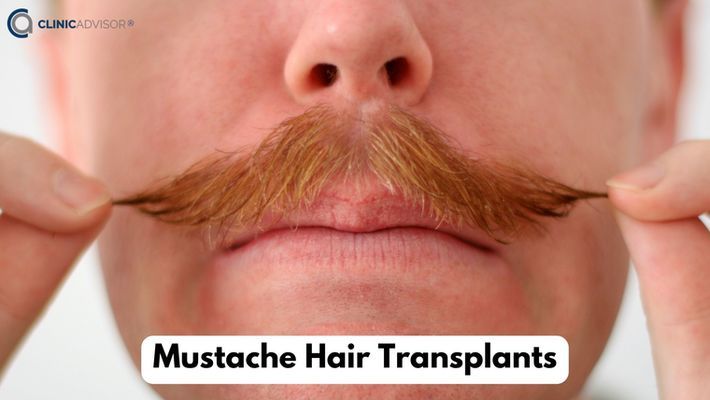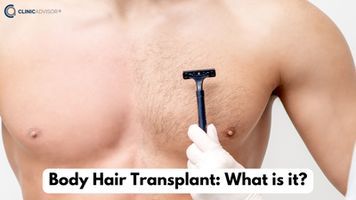If you are suffering from mustache loss, then you might have asked yourself what could be causing this problem.
Well, there are many causes of mustache loss including genetics, burns, and injuries. With spotty or no mustache at all, some men might feel like a part of their essential masculinity is missing.
A man then might decide to undergo a procedure known as a "mustache hair transplant" in an attempt to restore his masculine appeal.
So, what is a mustache transplant?
Mustache transplant is a minimally invasive surgical procedure that involves moving hair from donor areas in the scalp and placing (transplanting) them in the affected mustache areas.
The transplanted hairs are then expected to have the required characteristics and permanency of the donor hair.
For this reason, the doctor will ensure to collect hairs from most baldness-resistant areas usually the sides and back of the scalp.
What is the specialist’s role before carrying out the procedure?
The hair transplant specialist’s significant role at this stage is mainly about ensuring that the right number of hairs are extracted.
Depending on the case and the patient’s expectations, the specialist will make sure that only the right number of hairs are taken to cover the spotty areas in the mustache (no more no less).
 Mustache hair transplant results by Avrupa Hair Transplant Clinic
Mustache hair transplant results by Avrupa Hair Transplant Clinic
How is the mustache transplant carried out?
There are four main steps in which the mustache transplant is performed:
Stage 1: Local Anesthesia
A specialized anesthesiologist will administer the anesthetic drug under the skin on the donor area.
The patient will be lying down on their stomach to prepare the donor area for graft extraction.
Stage 2: Donor Harvesting
The hair transplant doctor along with their medical team will start by extracting hair follicles one by one from the donor area following the principles of a technique known as Follicular Unit Extraction (FUE).
Another technique to do this is known as Follicular Unit Transplant (FUT) in which the surgeon takes a strip of tissue from the donor area and harvests the hairs later.
As you can tell from both descriptions here, FUE is less invasive, modern, and usually preferable.
Actually, FUE has been developed to mediate the undesired side effects of FUT including scars.
Stage 3: Opening Channels
After the hair follicles are harvested, the time comes for them to be transplanted in the targeted mustache area.
To do this, the doctor starts by making small incisions in the targeted area with the picture in mind of the original hair growth angle.
Stage 4: Grafts Implantation
After opening the channels, the doctor and his/her assistants start placing the harvested hairs one by one in the targeted area, following the same growth direction and angle as the original mustache.
The cost of a mustache hair transplant
The cost of a mustache transplant varies depending on many factors including the destination country and the number of grafts to be transplanted.
For example, in the U.S. you can expect to pay $4000-$9000 for a mustache transplant.
While you can reduce this amount if you consider a mustache transplant in Turkey for example.
In this regard, Turkey has sparked in the past years as it’s believed to have successfully managed to maintain a balance between high quality and affordable costs.
Some sources indicate that the cost of a mustache transplant in Turkey ranges from 1500-2500 USD all-inclusive.
Recovery and results of mustache transplant
After the mustache transplant is completed patients should expect shedding of the transplanted hairs which starts 3-4 weeks after the operation.
The hair starts to grow back by the 3rd month. Final results however mostly take between 9 to 12 months or in some cases, it can take up to 18 months.
One important thing to remember here is that the transplanted hairs will maintain their pre-existing properties.
It’s the physician’s job as well to advise their patient about the best post-mustache transplant care guideline in order to ensure optimal desired results.
Side effects after mustache transplant
Speaking of mustache transplant side effects, one might experience some slight pain right after the operation especially when the anesthetic effect starts to wear off.
Tiny bruises, swelling, bleeding, redness, and/or numbness are also some of the expected and temporary side effects.
Usually, those side effects appear within the first week to 10 days before disappearing gradually.
If one or more of these side effects persist you must consult your doctor.
Potential complications and risks after mustache hair transplant
Although a mustache transplant might fall in the category of less-invasive cosmetic procedures, it's still a medical procedure that might have some complications associated with it.
It's usually on both the physician's and patient's sides to work together early on to avoid any such complications that might include:
- Infection
- Skin necrosis
- Postoperative discomfort
- Pimples









Share Your Opinion, Please